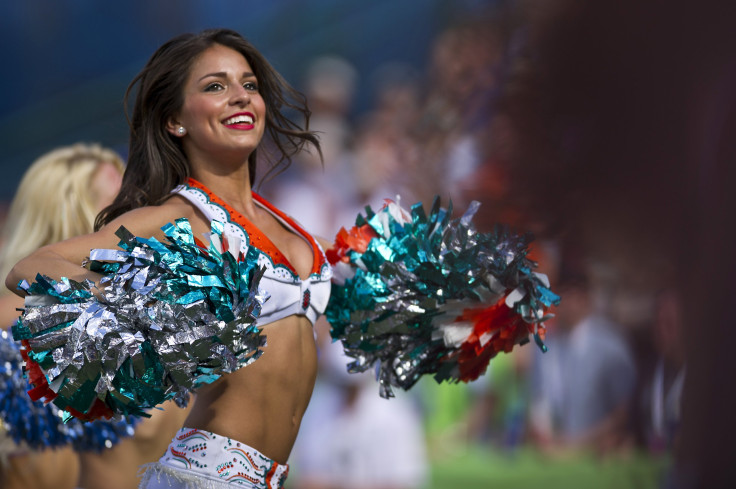NFL Cheerleader Pay: Fearing Retribution, Squads ‘Terrified’ To Speak Out About Scant Salaries, Sources Say

Imagine the grueling and obstacle-ridden process of becoming an NFL cheerleader. You begin by facing off against 500 young women, each more talented and driven than the next. By the time it’s all over, you’re one of just 32 picked. You are now part of an elite squad, at the top of your game, so to speak, in an admittedly short career. It’s easy to see why you’d feel privileged.
But just because you feel privileged for doing a job, does it mean that job has no marketplace value? That’s the question being asked in light of a wage lawsuit filed last week by an anonymous Oakland Raiders cheerleader who said she was paid a mere $1,250 for an entire season, an amount that adds up to less than $5 per hour when rehearsals and unpaid events are factored in.
While the lawsuit has thrust the issue of cheerleader pay into the spotlight, we were hard-pressed to find a current NFL cheerleader willing to speak about the issue. Sources tell International Business Times that the management staffs of NFL teams have been on high alert since the lawsuit broke, telling their cheerleaders not to speak to the press or coaching them on what to say if they are asked certain questions. The cheerleaders, not wanting to jeopardize their once-in-a-lifetime opportunity, are opting not to rock the boat.
“Everyone is terrified to speak up or say anything to anyone,” said one anonymous source, a parent of an NFL cheerleader, who spoke with IBTimes through a third party out of fear that the cheerleaders sharing information would be identified. “If it gets back to one of your coaches, then you would be viewed as not being a team player. You certainly would not make it back on the team the following year. Being blacklisted is common. All the coaches from the various NFL teams talk and know each other.”
The unwillingness to speak out is not just out of fear of retribution but also undeniably tied to that aforementioned culture of privilege, a sense among NFL cheerleaders that they are simply lucky to have been chosen for the gig. Even many of those whose cheering days have long since passed are quick to defend the idea that NFL cheering is more a higher calling than a vocation.
“I did look at it as a privilege and an honor,” said Mireya Mayor, a former cheerleader for the Miami Dolphins. “I never did it for the money, clearly. I did it because I love football, because I love to dance. It kept me physically fit, and I was able to do amazing community outreach.”
And for Mayor, it’s safe to say it all paid off. Since her cheering days as a University of Miami student, she has gone on to earn her Ph.D. in anthropology. Today she is a globe-trekking correspondent for National Geographic, known as the “female Indiana Jones” by media outlets quick to play up the dichotomy between her adventurous career and cheerleading past.

In her first few years with the Dolphins in the early 1990s, Mayor was paid just $25 a game, and yet she said she never felt victimized by the admittedly low compensation. “I was well aware of what I was getting myself into,” she said. “It was a choice that I made. It’s one of those things where, if you think it’s unfair, don’t do it.”
But a rising tide of critics say the $9.5 billion pro-football industry has both an ethical and a legal responsibility to alleviate the litany of financial hardships currently being placed on the women who are such an integral part of the game. Scant pay aside, sources say cheerleaders are required to perform at numerous unpaid events and charity functions each season. Those who don’t make their minimum are simply not asked back. They are responsible for cleaning and repairing their own uniforms, which are considered “on loan.” If a uniform is damaged beyond repair during a routine, it’s the cheerleader’s responsibility to pay for a new one, which can equal a full day’s pay, according to sources.
In many cases the financial obligations for NFL cheerleaders begin even before tryouts. Audition fees are common. The Seattle Seahawks, for example, require a cash-only payment of $20 at the time of registration for girls auditioning to become a Sea Gal cheerleader. Such a fee, it’s worth pointing out, would be highly frowned upon in the entertainment industry, and in fact would run afoul of guidelines laid out by the Screen Actors Guild, which considers an audition akin to a job interview. (Imagine paying a fee to apply to McDonald’s.)
Mayor said the difference is that cheerleading is not typically seen as a lifelong pursuit. “It was more of a lifestyle choice than a career path for me,” said Mayor. “Everyone knows it’s a short-lived tenure.”
Short-lived or no, federal and state minimum-wage requirements still apply to any agreement that can be deemed in the eyes of the law as an employment situation, a fact currently being proven by the flood of recent lawsuits by unpaid interns.
One person familiar with the NFL said more cheerleader lawsuits are also coming but declined to say which teams will be the target. In the meantime, public opinion is shifting. A petition on Change.org, launched just a few weeks before the Raiders lawsuit, has attracted more than 68,000 signatures. Diane Todd, who launched the petition, said she was inspired to act for the sake of her 14-year-old daughter, a competition cheerleader for the Santa Monica Vikings, a youth sports association. “From my perspective, football and cheerleading go together,” Todd told IBTimes in an email. “My daughter may one day want to become an NFL cheerleader, but not at this wage.”
Despite growing calls for teams to pay their cheerleaders a living wage, the pro-football industry doesn’t appear to see it as in issue worth discussing. IBTimes reached out to spokespeople for the Seahawks, Broncos, Raiders and the NFL itself for this article. None responded to requests for comment on the issue of cheerleader pay.
Mayor said that even though she was comfortable with her level of compensation, she applauded the Raiderette’s courage and said the lawsuit could lead to positive changes. “I think when they break down the hours, they’ll probably see that, yeah, they’re getting paid less than minimum wage,” Mayor said. “There’s no question about it.”
Got a news tip? Email me. Follow me on Twitter @christopherzara.
© Copyright IBTimes 2024. All rights reserved.












